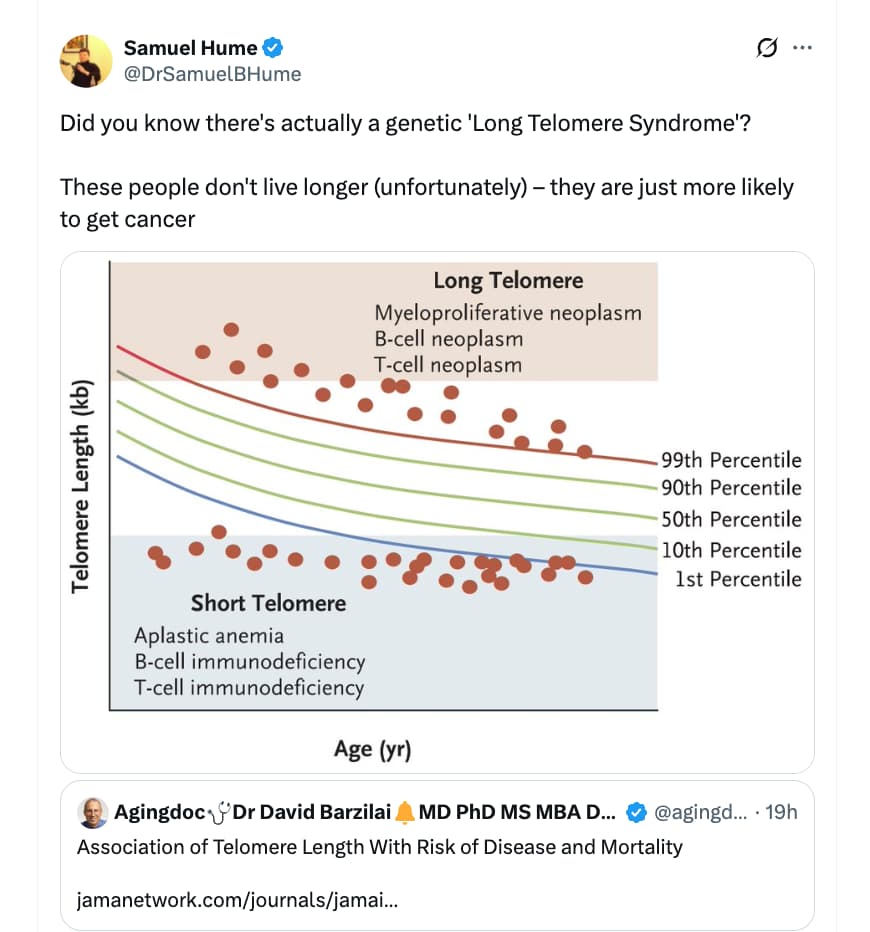Does anyone see any efficacy in individuals undergoing Telomere testing? For example, before one starts rapamycin would a baseline Telomere test be helpful and then periodic ones down the line while taking Rapamycin? Are Telomere lengths impacted by Rapamycin?
Here is what I’ve seen on this issue:
Nobel Prize winner Elizabeth Blackburn, PhD, and University of California San Francisco health psychologist Elissa Epel, PhD, wrote the book titled The Telomere Effect: A Revolutionary Approach to Living Younger, Healthier, Longer
Epel says scientists don’t know how easily we can change our telomere length and whether changing it in the short term makes much of a difference for longevity. That’s in part because long-term studies haven’t been done.
“There are indeed no single studies that have shown that lifestyle can change telomeres and in turn longer telomeres can lengthen life span,”
Additionally:
Other experts say that except for a few diseases, like pulmonary fibrosis, most telomere research at this point shows only associations rather than direct cause and effect.
“We don’t understand how telomeres affect aging," says Titia de Lange, PhD, a professor and head of the Laboratory of Cell Biology and Genetics at The Rockefeller University in New York. She’s studied telomere for 3 decades.
“Telomeres get shorter with age but this is all correlative, so it could be like grey hair: Yes, it happens but it’s not going to kill you,” de Lange says. “Basically none of the big questions have been answered. There is just a lot of correlative data – some with dubious validity – that so far has raised more questions than given answers.”
Mary Armanios, MD, clinical director of the Telomere Center at Johns Hopkins Hospital in Baltimore, says the research community has more nuanced views about telomeres.
“It is not so simple that short telomeres are bad and long telomeres are good. What we are finding is that ‘middle-of-the-road’ telomeres are the best. There is also growing evidence that telomeres cannot be altered by environmental choices,” she says.
…
She says that telomeres became a pop culture phenomenon because we can measure them. “The fact that they are measureable in contrast to other changes with aging has put them in the spotlight,” Armanios says.
But aging is complicated, and many things, including our genes and environment, contribute to how we age, she says. “A telomere-centered view is a very narrow way to look at human aging in general, and the picture is more complicated.”
Now - that article above is a few years old, but I’m not sure if anything has changed. Certainly I’m not aware of any significant changes in the data. Perhaps someone else has better, newer research papers they can link to.
I’ve never seen anything to suggest that rapamycin would have any direct effect on telomeres (though it might slow the degradation of telomeres because it slows cell division).
More related reading:
This is just the information I needed. I love this website. The best place to go to get direct answers on a longevity topic. Thanks RapAdmin for going above and beyond.
I have just got my second telomere result from TruDiagnostic. The first was from April at 6.85 kilobases and the second from July at 6.89 kilobases. (ie an increase of 40 base pairs) Does anyone know whether this could be simply statistical error or not?
I’ve read that telomere measures can vary as much as 5-10% so I doubt your results are significant.
HBOT report to increase by 20% telomere length Hyperbaric oxygen therapy increases telomere length and decreases immunosenescence in isolated blood cells: a prospective trial | Aging
Source: Familial Clonal Hematopoiesis in a Long Telomere Syndrome
and other information:
Association of Telomere Length With Risk of Disease and Mortality
Question Is telomere length associated with mortality and development of specific diseases?
Findings In this cohort study, UK Biobank data from more than 450 000 individuals found that reduced baseline leukocyte telomere length was associated with increased overall and various disease-specific mortalities. The study identified more than 200 disorders that were significantly overrepresented or underrepresented in participants with shorter leukocyte telomere length.
Meaning The study findings suggest the relevance of telomere shortening for several diseases and warrant further mechanistic and therapeutic studies.
Full paper: https://jamanetwork.com/journals/jamainternalmedicine/fullarticle/2788295
[quote=“RapAdmin, post:8, topic:800”]
data from more than 450 000 individuals found that reduced baseline leukocyte telomere length was associated with increased overall and various disease-specific mortalities.
[/quote]
Yeah, since I injected myself with peptides that are supposed to increase telomere lengh, I think I will go with this view. ![]()
